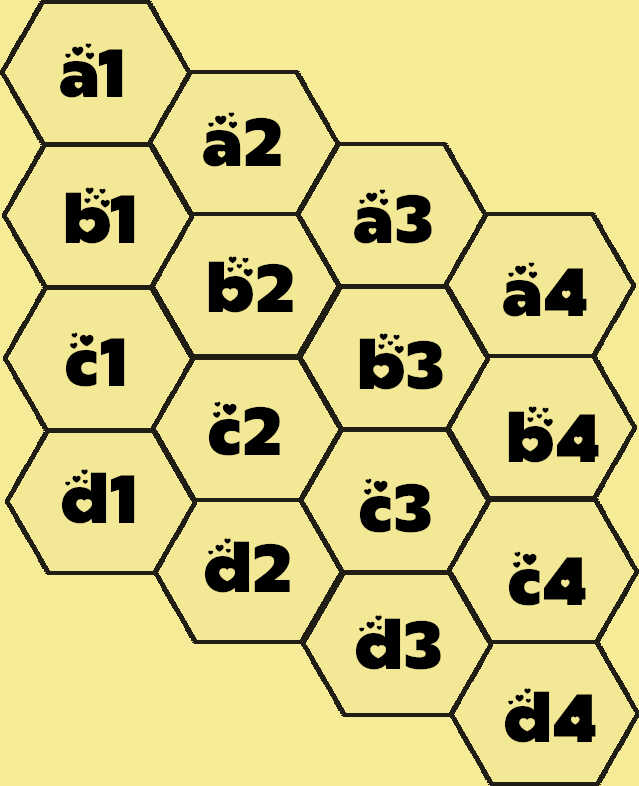The UAIS is planning to host a hex bot tournament. We're planning a series of workshops to get your team ready to win. Dates are broadly undecided and will be announced sometime mid October. The tournament itself will likely take place at the end of fall semester or right at the beginning of winter 2023
This repository contains a reference implementation for a very basic random guess bot, the central communicating program, and defines the communication protocol. Bots must adhere to this protocol exactly, lest an inconsistent state between opponents arise. To ensure that adherence is ensured, a test script in "Test/" has been provided which takes the name of your program as an argument.
The Bot infrastructure is 🚀blazing fast⚡, since it's been written in fearlessly concurrent and zero-cost abstracted ✨Rust✨.
Board size and turn limits will depend on the number of contestants interested, and the computing power IST is willing to lend us. We're aiming to use 11x11 boards, since this data set has a lot of training examples for 11x11. We're aiming for 5 games per bot, possibly with 2 minute turns
If there's enough interest, we'd also like to do a smaller board bracket, say 7x7. This bracket may be of better interest to search algorithms and newcomers
Hex is a classic board game for bots to play. It consists of two players, we'll denote them red and blue, trying to form and uninterrupted path between their sides of the board. On each turn, a player must place exactly one piece in any untaken tile. It's like extended tiktoktoe
Our board uses coordinates of the form [a-z][0-9]+. Hexagons are adjacent to
2-6 other hexagons, depending on their position. An example of our coordinate
system on a 4x4 grid looks like the one below. Bots must be able to implement up
to 26x26 sized boards. All boards will be square
This program will start up both bots, send and receive communication and validate moves. Provide a full path to both executables as the argument
The program implements the following commands, which it reads from stdin line by
line. Errors, such as a bot failing to start up, will be output to the stderr.
Everything else goes in stdout. All commands can be used via their first letter
only. For example next and n map to the same command
| Cmd | Effect |
|---|---|
help |
Prints a helpful ;) message |
next |
Messages and receives a move from the next bot |
run {} |
Plays the next {} turns sequentially, where {} is an integer |
show |
Shows the central board |
showall |
Shows the internal board of each bot and the central board |
check |
Checks if a bot has won |
quit |
Shuts down both bots |
We'll be keeping things simple and use stdin/stdout messaging. Your bot must
implement valid responses to all the messages below. Each message is terminated
by a line break, notated \n on unix. An invalid response may result in an
immediate loss, so don't try to cheat
| Message | Example | Description |
|---|---|---|
init_board {digit} |
init_board 8 |
Tells the bot to reset the game to an empty board w/ side length "digit" |
show_board |
show_board |
Prints the board to stdout. Used for internal testing |
make_move |
make_move |
Asks the bot to give their move, based on the current board |
seto {} |
seto a1 |
Tells the bot about a move for the other bot |
sety {} |
sety a1 |
Tells the bot to play a move for itself |
swap |
swap |
Uses the opening "swap" move in Hex |
unset {} |
unset a1 |
Tells the bot to set a tile as unused |
check_win |
check_win |
Tells the bot to check if the game is over. Returns 1 if itself has won, -1 if the opponent has won, 0 if the game has not terminated. Note that draws are mathematically impossible in Hex. |
quit |
quit |
The game is over |
Example message sequence:
init_board 11
make_move
seto a1
make_move
seto f4
make_move
quit
| Message from central program | Response required from bot | Example | Internal state |
|---|---|---|---|
init_board |
None | None | Reset the board and move counters |
make_move |
Respond with the coordinate you set your tile at | a1 |
Set the tile on your board too |
seto {} |
None | None | Set the coordinate as the opponent's tile on your board |
sety {} |
None | None | Set the coordinate as the your tile on your board |
unset {} |
None | None | Set the coordinate as an unmarked tile on your board |
quit |
Exit code 0 | None | Run destructors and shutdown program, preferably with exit code 0 |
Your bot must take in exactly 1 positional argument, either "black" or "white". These will tell your bot which side it's playing on. See the random_bot for a python3 example
The black player wins when they have an uninterrupted path from top to bottom. For example, they could have filled 1 column with their tiles. The white player wins when they have an uninterrupted path from left to right, like a row filled with their tiles
